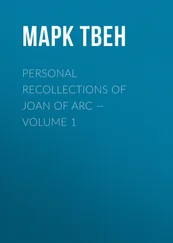Mark Twain - Personal Recollections of Joan of Arc — Volume 1
Здесь есть возможность читать онлайн «Mark Twain - Personal Recollections of Joan of Arc — Volume 1» весь текст электронной книги совершенно бесплатно (целиком полную версию без сокращений). В некоторых случаях можно слушать аудио, скачать через торрент в формате fb2 и присутствует краткое содержание. Год выпуска: 2004, Жанр: Историческая проза, на английском языке. Описание произведения, (предисловие) а так же отзывы посетителей доступны на портале библиотеки ЛибКат.
- Название:Personal Recollections of Joan of Arc — Volume 1
- Автор:
- Жанр:
- Год:2004
- ISBN:нет данных
- Рейтинг книги:5 / 5. Голосов: 1
-
Избранное:Добавить в избранное
- Отзывы:
-
Ваша оценка:
- 100
- 1
- 2
- 3
- 4
- 5
Personal Recollections of Joan of Arc — Volume 1: краткое содержание, описание и аннотация
Предлагаем к чтению аннотацию, описание, краткое содержание или предисловие (зависит от того, что написал сам автор книги «Personal Recollections of Joan of Arc — Volume 1»). Если вы не нашли необходимую информацию о книге — напишите в комментариях, мы постараемся отыскать её.
Personal Recollections of Joan of Arc — Volume 1 — читать онлайн бесплатно полную книгу (весь текст) целиком
Ниже представлен текст книги, разбитый по страницам. Система сохранения места последней прочитанной страницы, позволяет с удобством читать онлайн бесплатно книгу «Personal Recollections of Joan of Arc — Volume 1», без необходимости каждый раз заново искать на чём Вы остановились. Поставьте закладку, и сможете в любой момент перейти на страницу, на которой закончили чтение.
Интервал:
Закладка:
"Do you acknowledge as your own the document which has just been read?"
"Yes, except that there are errors in it—words which make me give myself too much importance." I saw what was coming; I was troubled and ashamed. "For instance, I did not say 'Deliver up to the Maid' (rendez au la Pucelle); I said 'Deliver up to the King' (rendez au Roi); and I did not call myself 'Commander-in-Chief' (chef de guerre). All those are words which my secretary substituted; or mayhap he misheard me or forgot what I said."
She did not look at me when she said it: she spared me that embarrassment. I hadn't misheard her at all, and hadn't forgotten. I changed her language purposely, for she was Commander-in-Chief and entitled to call herself so, and it was becoming and proper, too; and who was going to surrender anything to the King?—at that time a stick, a cipher? If any surrendering was done, it would be to the noble Maid of Vaucouleurs, already famed and formidable though she had not yet struck a blow.
Ah, there would have been a fine and disagreeable episode (for me) there, if that pitiless court had discovered that the very scribbler of that piece of dictation, secretary to Joan of Arc, was present—and not only present, but helping build the record; and not only that, but destined at a far distant day to testify against lies and perversions smuggled into it by Cauchon and deliver them over to eternal infamy!
"Do you acknowledge that you dictated this proclamation?"
"I do."
"Have you repented of it? Do you retract it?"
Ah, then she was indignant!
"No! Not even these chains"—and she shook them—"not even these chains can chill the hopes that I uttered there. And more!"—she rose, and stood a moment with a divine strange light kindling in her face, then her words burst forth as in a flood—"I warn you now that before seven years a disaster will smite the English, oh, many fold greater than the fall of Orleans! and—"
"Silence! Sit down!"
"—and then, soon after, they will lose all France!"
Now consider these things. The French armies no longer existed. The French cause was standing still, our King was standing still, there was no hint that by and by the Constable Richemont would come forward and take up the great work of Joan of Arc and finish it. In face of all this, Joan made that prophecy—made it with perfect confidence—and it came true. For within five years Paris fell—1436—and our King marched into it flying the victor's flag. So the first part of the prophecy was then fulfilled—in fact, almost the entire prophecy; for, with Paris in our hands, the fulfilment of the rest of it was assured.
Twenty years later all France was ours excepting a single town—Calais.
Now that will remind you of an earlier prophecy of Joan's. At the time that she wanted to take Paris and could have done it with ease if our King had but consented, she said that that was the golden time; that, with Paris ours, all France would be ours in six months. But if this golden opportunity to recover France was wasted, said she, "I give you twenty years to do it in."
She was right. After Paris fell, in 1436, the rest of the work had to be done city by city, castle by castle, and it took twenty years to finish it.
Yes, it was the first day of March, 1431, there in the court, that she stood in the view of everybody and uttered that strange and incredible prediction. Now and then, in this world, somebody's prophecy turns up correct, but when you come to look into it there is sure to be considerable room for suspicion that the prophecy was made after the fact. But here the matter is different. There in that court Joan's prophecy was set down in the official record at the hour and moment of its utterance, years before the fulfilment, and there you may read it to this day.
Twenty-five years after Joan's death the record was produced in the great Court of the Rehabilitation and verified under oath by Manchon and me, and surviving judges of our court confirmed the exactness of the record in their testimony.
Joan' startling utterance on that now so celebrated first of March stirred up a great turmoil, and it was some time before it quieted down again. Naturally, everybody was troubled, for a prophecy is a grisly and awful thing, whether one thinks it ascends from hell or comes down from heaven.
All that these people felt sure of was, that the inspiration back of it was genuine and puissant.
They would have given their right hands to know the source of it.
At last the questions began again.
"How do you know that those things are going to happen?"
"I know it by revelation. And I know it as surely as I know that you sit here before me."
This sort of answer was not going to allay the spreading uneasiness. Therefore, after some further dallying the judge got the subject out of the way and took up one which he could enjoy more.
"What languages do your Voices speak?"
"French."
"St. Marguerite, too?"
"Verily; why not? She is on our side, not on the English!"
Saints and angels who did not condescend to speak English is a grave affront. They could not be brought into court and punished for contempt, but the tribunal could take silent note of Joan's remark and remember it against her; which they did. It might be useful by and by.
"Do your saints and angels wear jewelry?—crowns, rings, earrings?"
To Joan, questions like these were profane frivolities and not worthy of serious notice; she answered indifferently. But the question brought to her mind another matter, and she turned upon Cauchon and said:
"I had two rings. They have been taken away from me during my captivity. You have one of them. It is the gift of my brother. Give it back to me. If not to me, then I pray that it be given to the Church."
The judges conceived the idea that maybe these rings were for the working of enchantments.
Perhaps they could be made to do Joan a damage.
"Where is the other ring?"
"The Burgundians have it."
"Where did you get it?"
"My father and mother gave it to me."
"Describe it."
"It is plain and simple and has 'Jesus and Mary' engraved upon it."
Everybody could see that that was not a valuable equipment to do devil's work with. So that trail was not worth following. Still, to make sure, one of the judges asked Joan if she had ever cured sick people by touching them with the ring. She said no.
"Now as concerning the fairies, that were used to abide near by Domremy whereof there are many reports and traditions. It is said that your godmother surprised these creatures on a summer's night dancing under the tree called l'Arbre Fee de Bourlemont. Is it not possible that your pretended saints and angels are but those fairies?"
"Is that in your proces?"
She made no other answer.
"Have you not conversed with St. Marguerite and St. Catherine under that tree?"
"I do not know."
"Or by the fountain near the tree?"
"Yes, sometimes."
"What promises did they make you?"
"None but such as they had God's warrant for."
"But what promises did they make?"
"That is not in your proces; yet I will say this much: they told me that the King would become master of his kingdom in spite of his enemies."
"And what else?"
There was a pause; then she said humbly:
"They promised to lead me to Paradise."
If faces do really betray what is passing in men's minds, a fear came upon many in that house, at this time, that maybe, after all, a chosen servant and herald of God was here being hunted to her death. The interest deepened. Movements and whisperings ceased: the stillness became almost painful.
Have you noticed that almost from the beginning the nature of the questions asked Joan showed that in some way or other the questioner very often already knew his fact before he asked his question? Have you noticed that somehow or other the questioners usually knew just how and were to search for Joan's secrets; that they really knew the bulk of her privacies—a fact not suspected by her—and that they had no task before them but to trick her into exposing those secrets?
Читать дальшеИнтервал:
Закладка:
Похожие книги на «Personal Recollections of Joan of Arc — Volume 1»
Представляем Вашему вниманию похожие книги на «Personal Recollections of Joan of Arc — Volume 1» списком для выбора. Мы отобрали схожую по названию и смыслу литературу в надежде предоставить читателям больше вариантов отыскать новые, интересные, ещё непрочитанные произведения.
Обсуждение, отзывы о книге «Personal Recollections of Joan of Arc — Volume 1» и просто собственные мнения читателей. Оставьте ваши комментарии, напишите, что Вы думаете о произведении, его смысле или главных героях. Укажите что конкретно понравилось, а что нет, и почему Вы так считаете.












